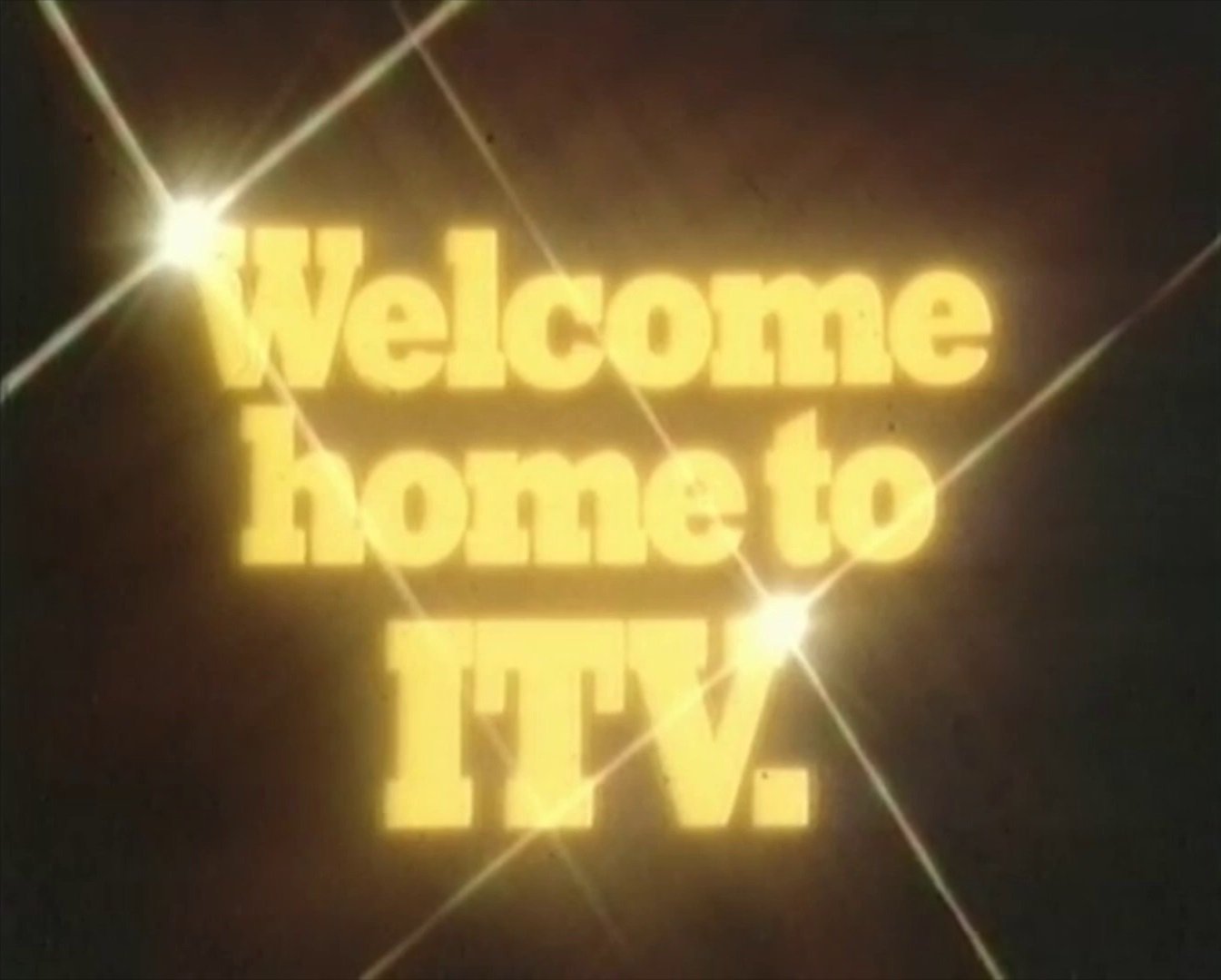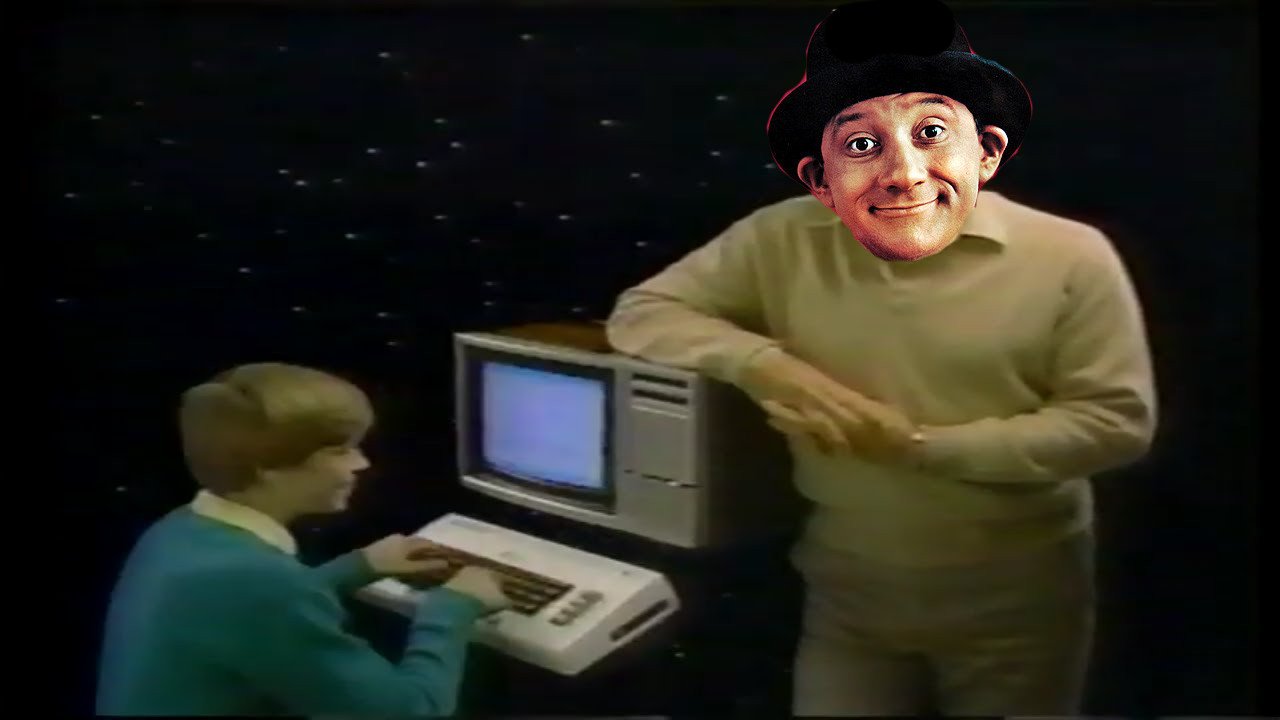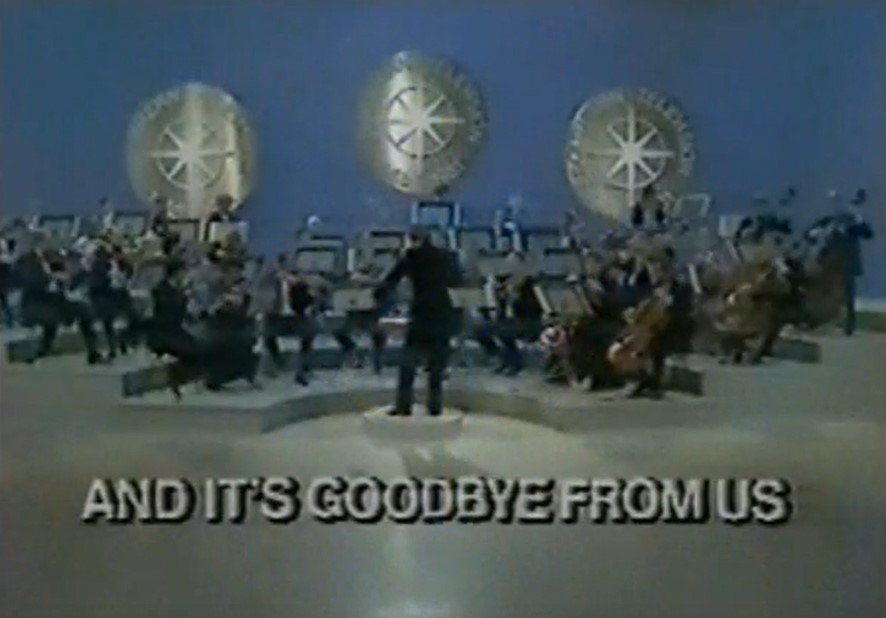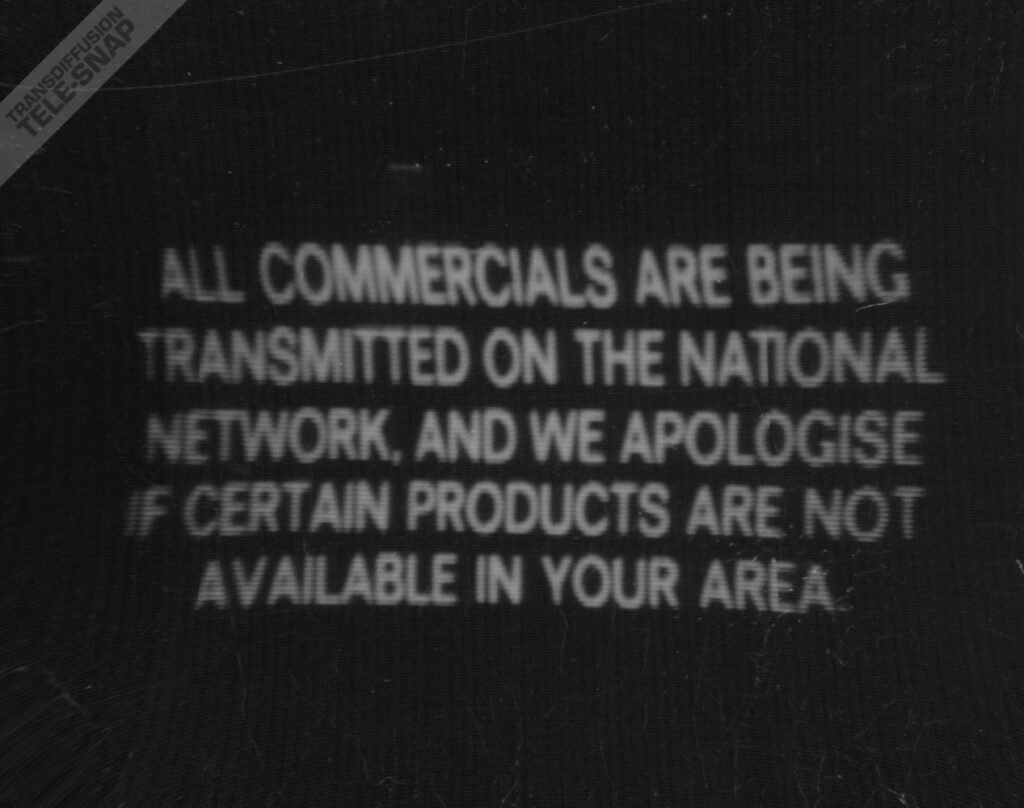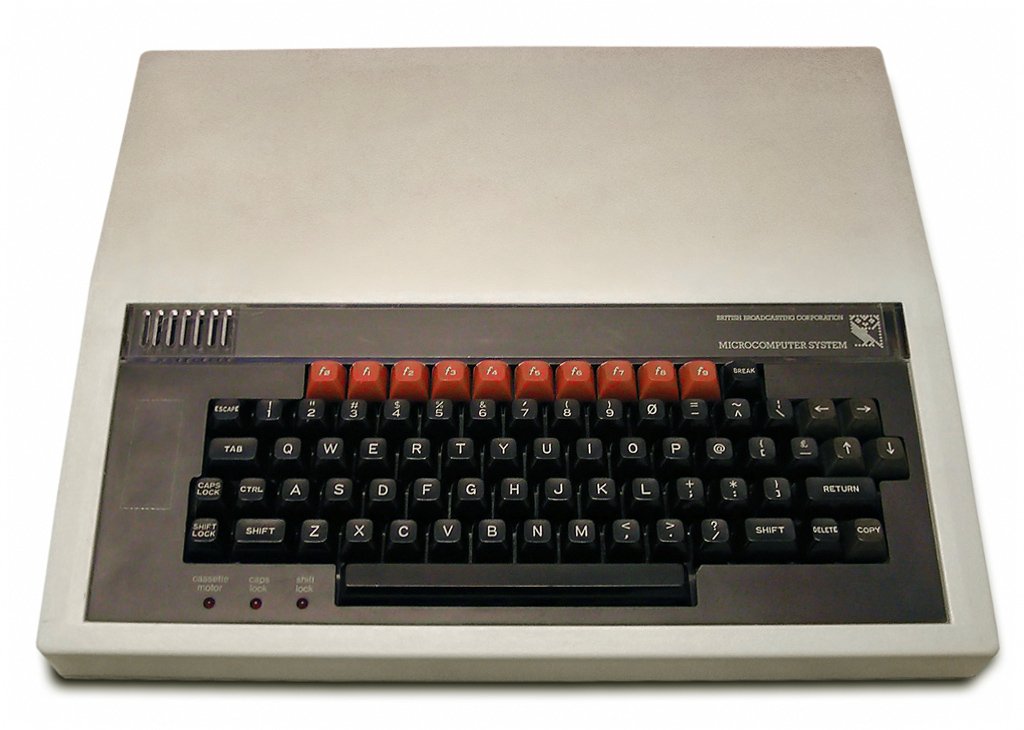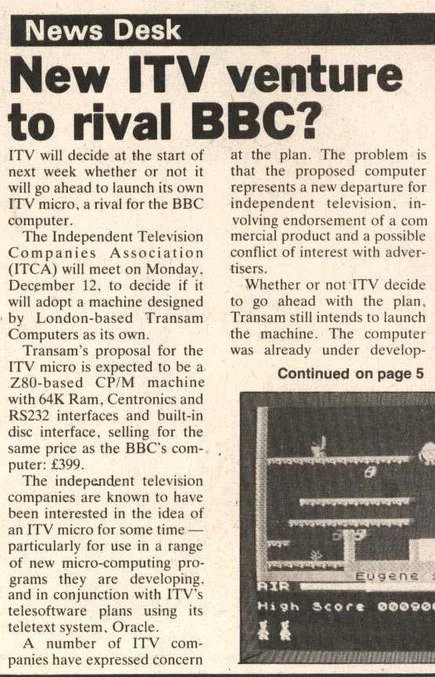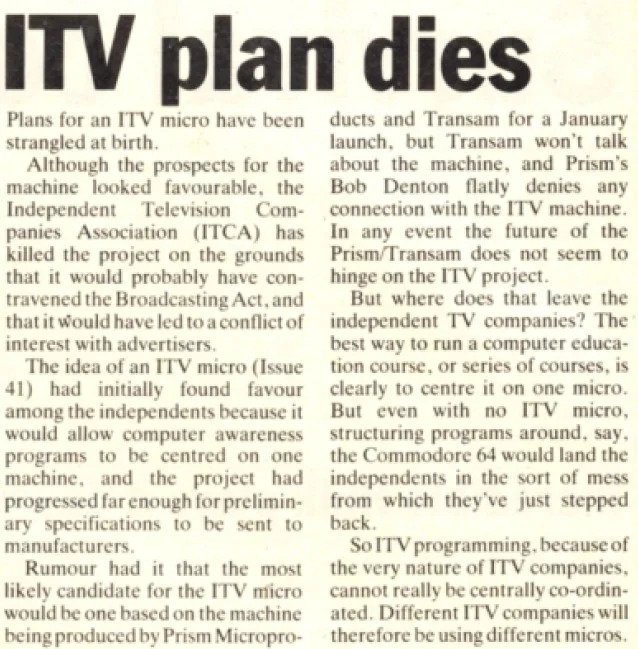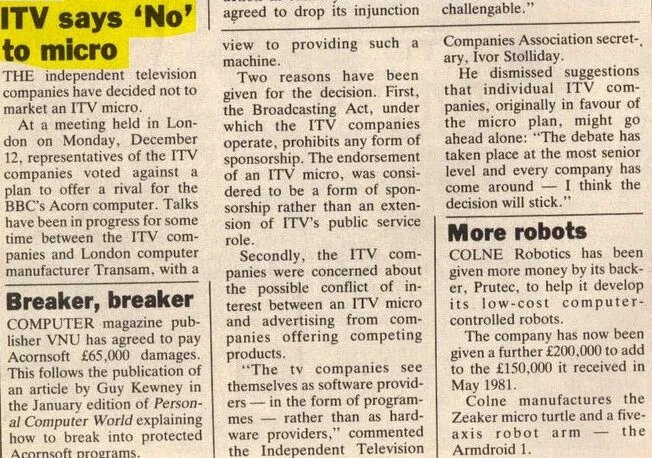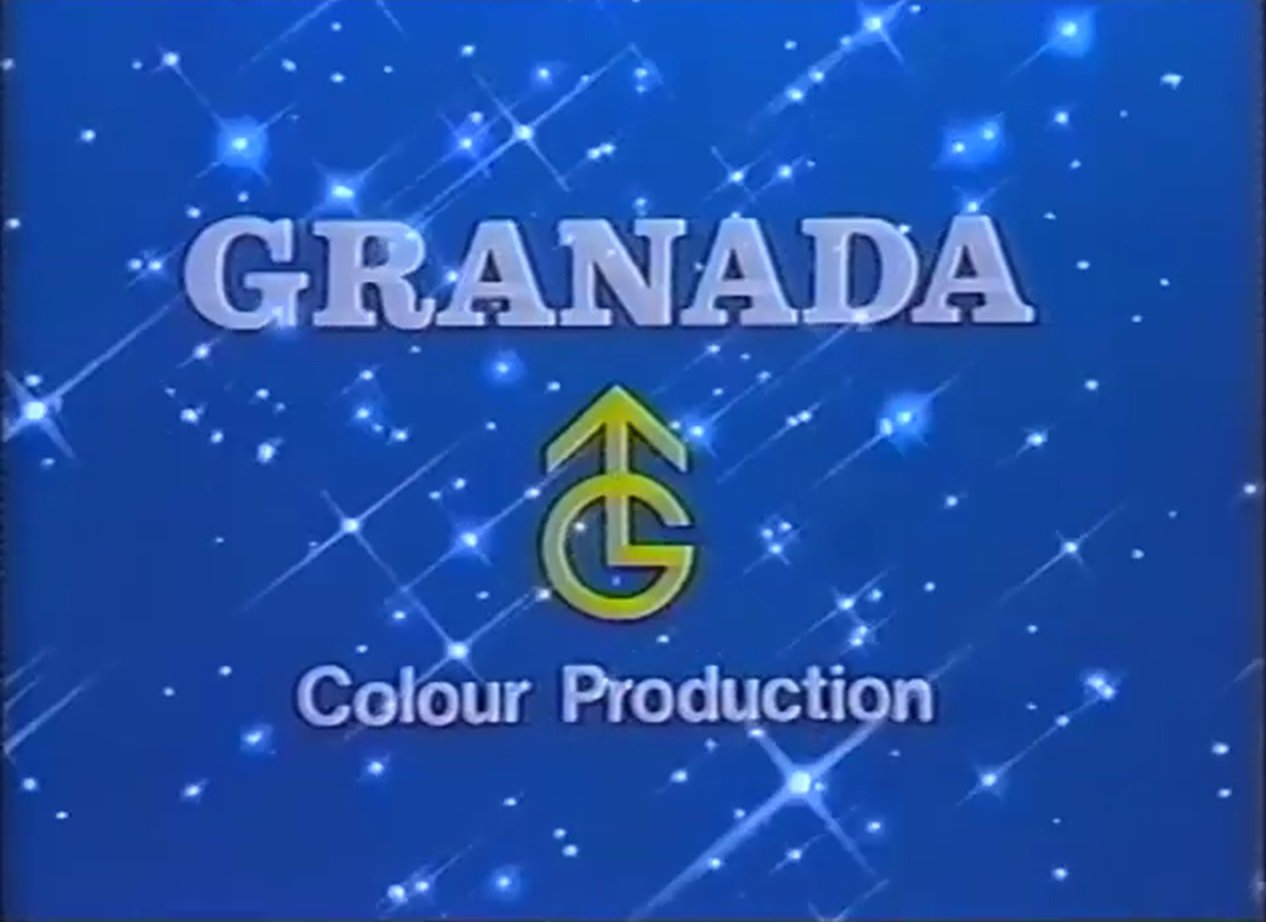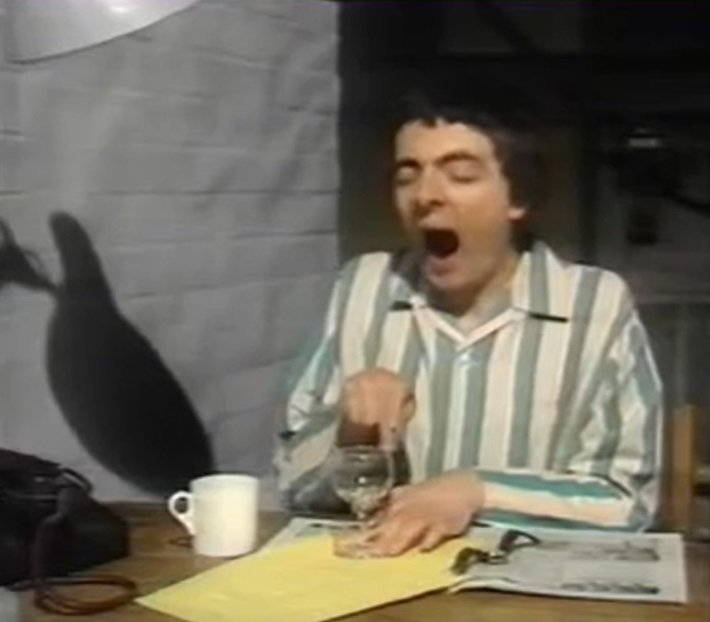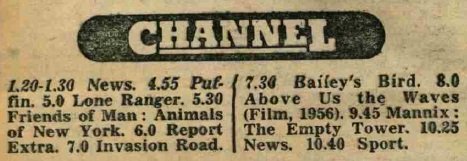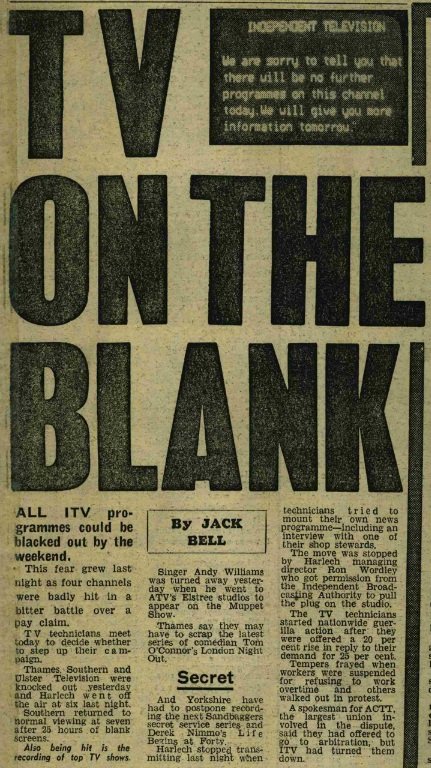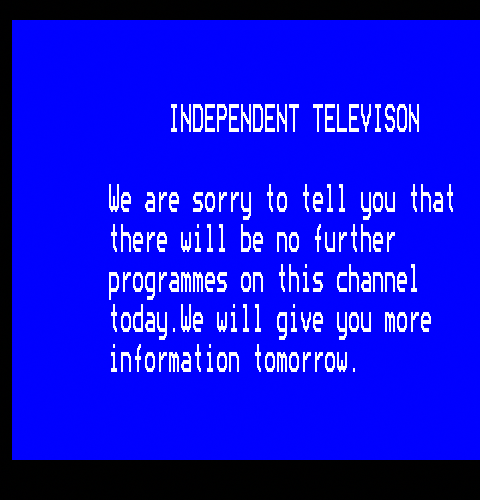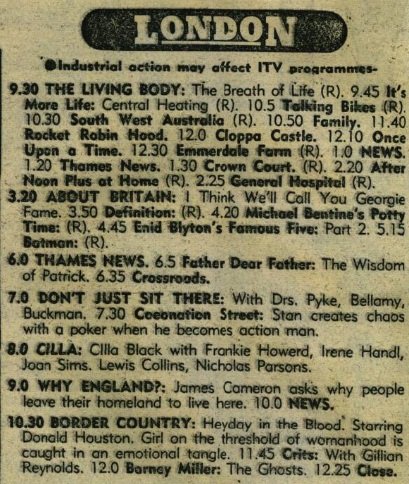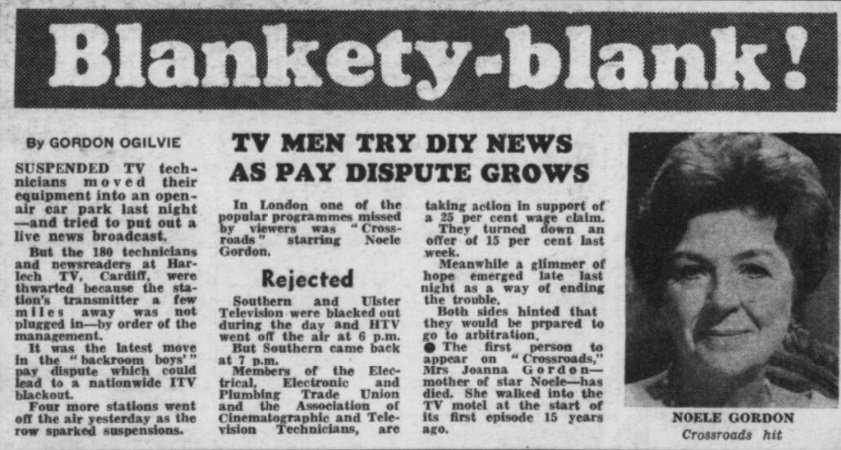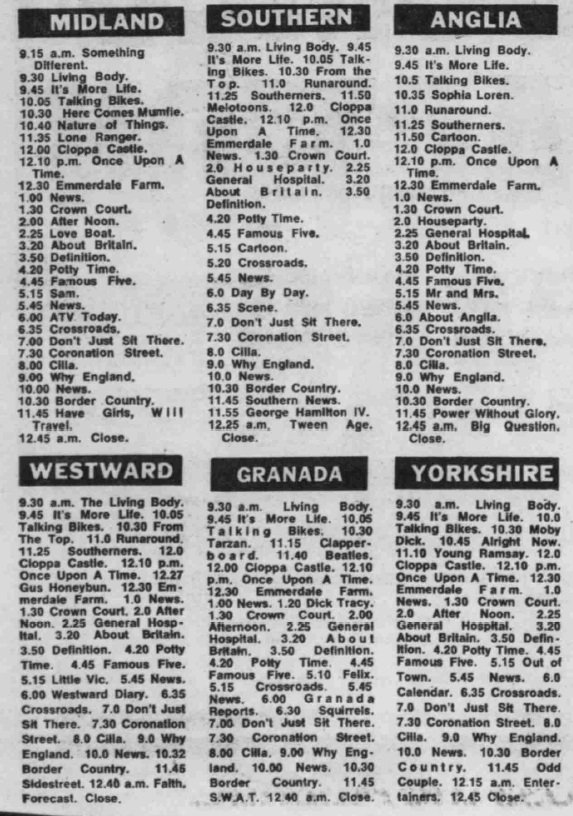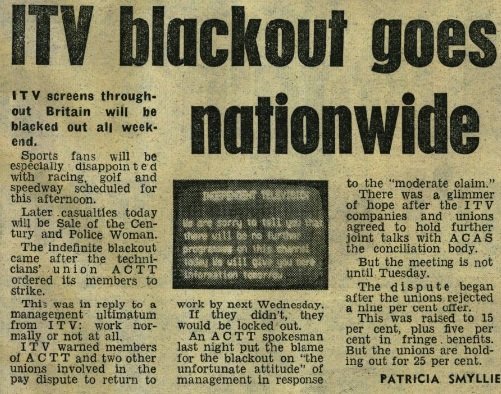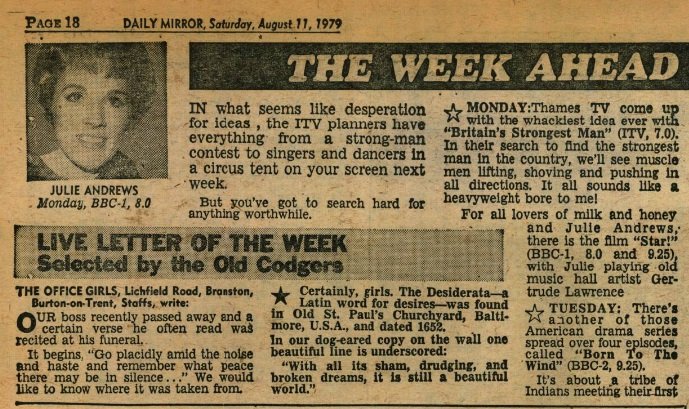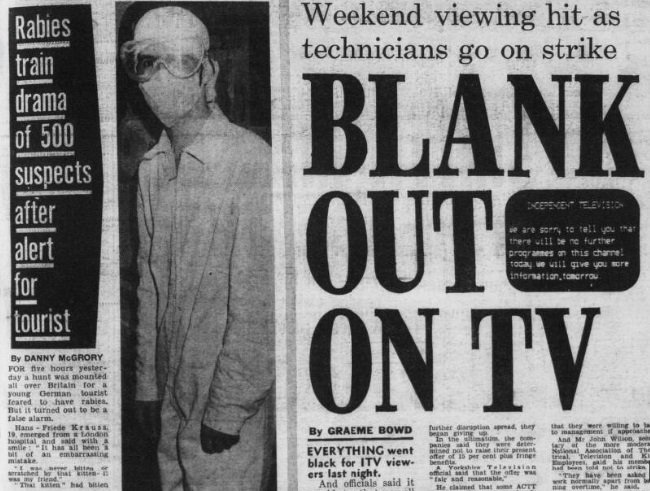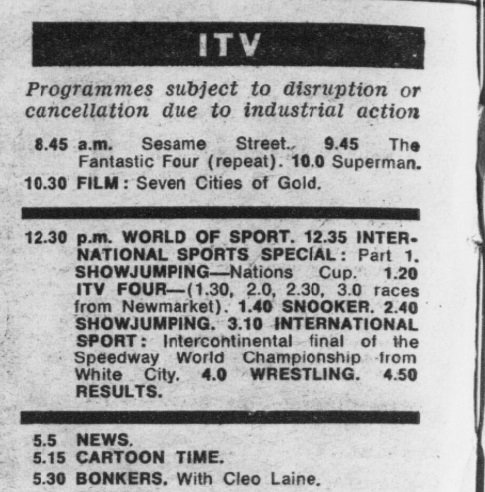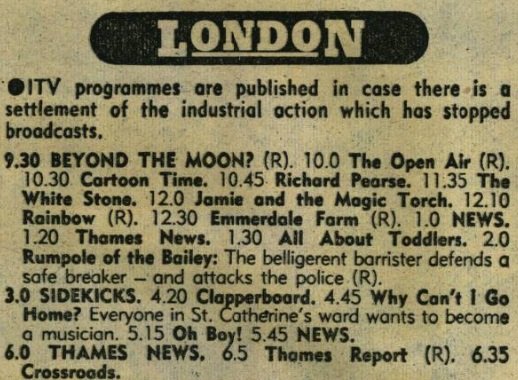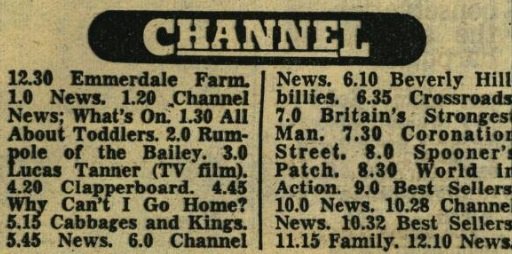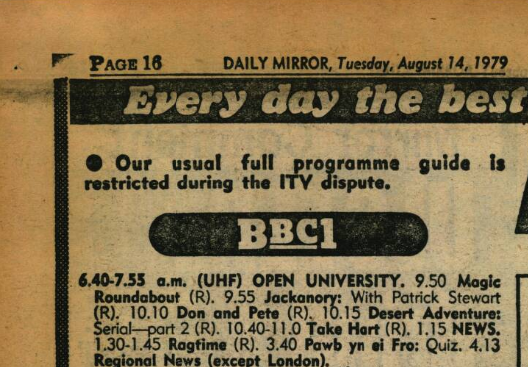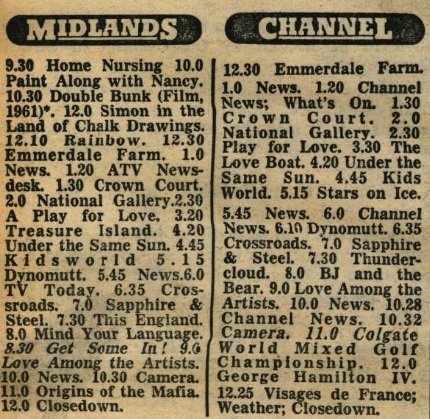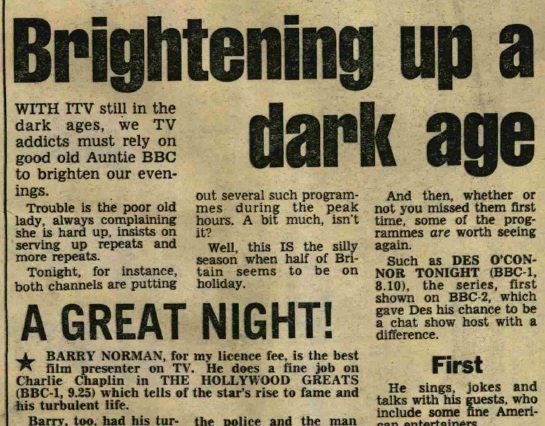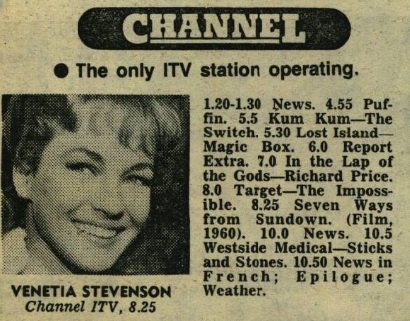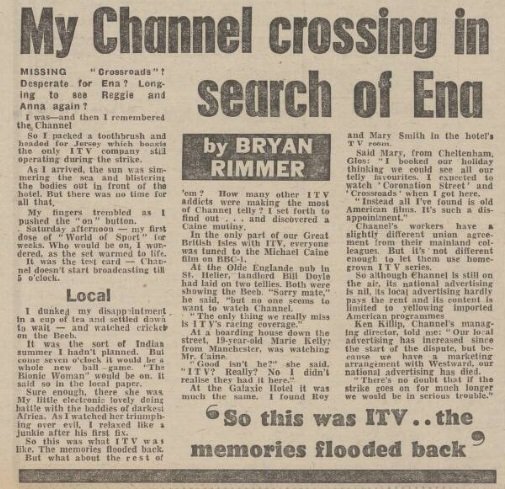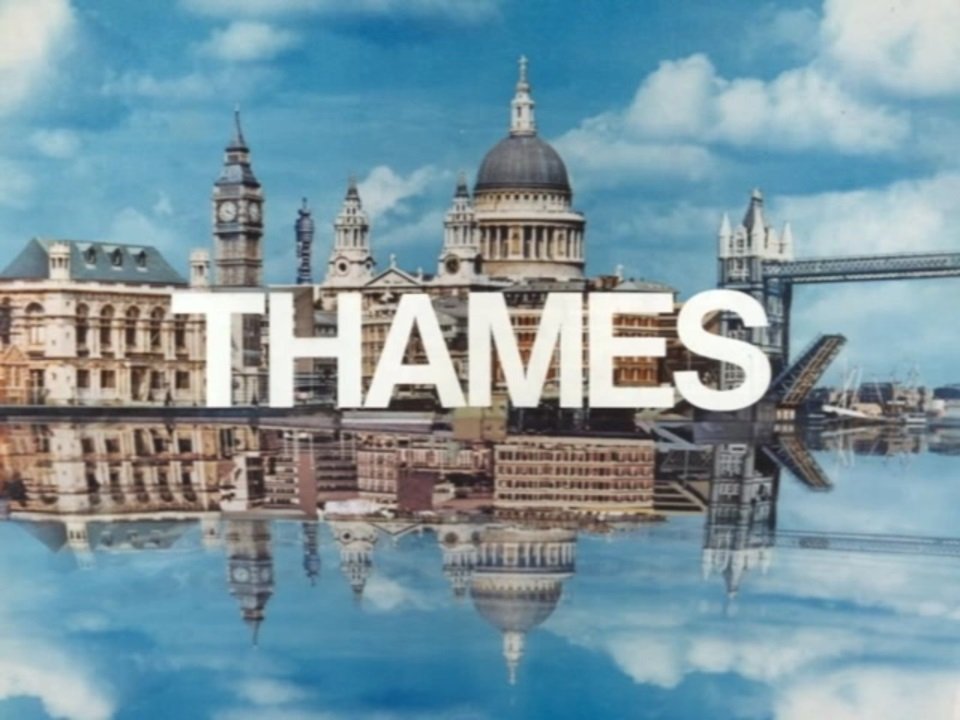Oof! Finally, here we are, with the last installment of dry facts and possibly ill-advised attempts at making light of industrial unrest.
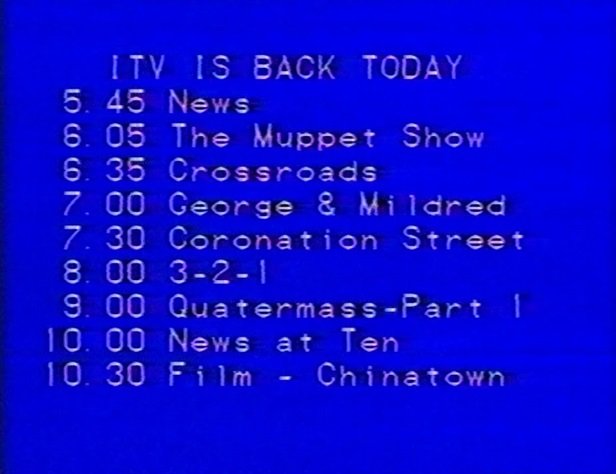
How were people coping?
We’ve already seen a few blase opinions from those tourists in the Channel Islands – but what about everyone else? Well, obviously they were watching the Beeb – but they weren’t entirely happy about it.
What with the strike starting in August, the BBC were sticking stubbornly to their usual summer schedule of repeats and sport. It must be understood that back in 1979, the very act of repeating any TV show for any reason whatsoever would cause The Great British Public to flail around their living rooms screeching like car alarms.
The idea that not everyone might have seen the original broadcast, and as a result might have wanted another chance to catch something they’d missed (or even if they had seen it and just wanted to watch it again in those pre-Sky-pre-streaming stone age times), never seemed to occur to anyone.
Indeed, in their twilight years, these would be the same sorts who watched 4:3 aspect ratio television with everything insanely stretched to 16:9 because “we paid for a widescreen telly, and we’re going to use all of it!!!”.
Nevertheless, a lot of viewers complained that the BBC ought to be putting on something more interesting than the fucking cricket. Of course, the reality of the situation meant BBCs 1 & 2 couldn’t simply be converted to Non-Commercial ITV – as explained by the “Comment” section of the Wolverhampton Express and Star on Wednesday 29th August 1979:
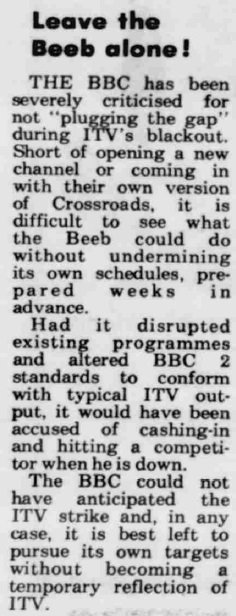
So, pretty obvious there. And when the calendar turned to autumn and the BBC ended the repeats, they began showing their own new programmes – which had quite an effect on their overall ratings. With no competition from ITV over September and most of October, BBC1’s ratings went through the roof, out up into the sky, left the atmosphere and probably touched the surface of the moon.
One of the more notable examples of this was the extraordinary, never-repeated achievement where the first two Doctor Who serials of the Autumn 1979 season – Destiny Of The Daleks and City Of Death – got phenomenal ratings the show has never matched since.
By the end of the former, ratings had risen to 14.4 million viewers, as calcuated by JICTAR. The last episode of the latter got just over 16 million, a level only achieved this century by a handful of football matches, various government announcements made during the pandemic, and the death of Queen Elizabeth II.
(For a full in-depth look into Doctor Who’s relation to ITV’s woes at the end of 70s, look at the nicely-titled Doctor Who And The 1979 ITV Strike, which sadly will not get a novelization from Terrence Dicks.)
A grim addendum
Before we continue, here’s a bit of business I have to properly address. In the previous part of this series, I mentioned that Yorkshire Televison broadcast a special message in place of the usual blue caption asking for information on the Yorkshire Ripper, then still at large. Well, here it is, shown below for completeness’s sake. It’s taken from Adam Martyn’s video on the ITV strike, which is also well worth watching:
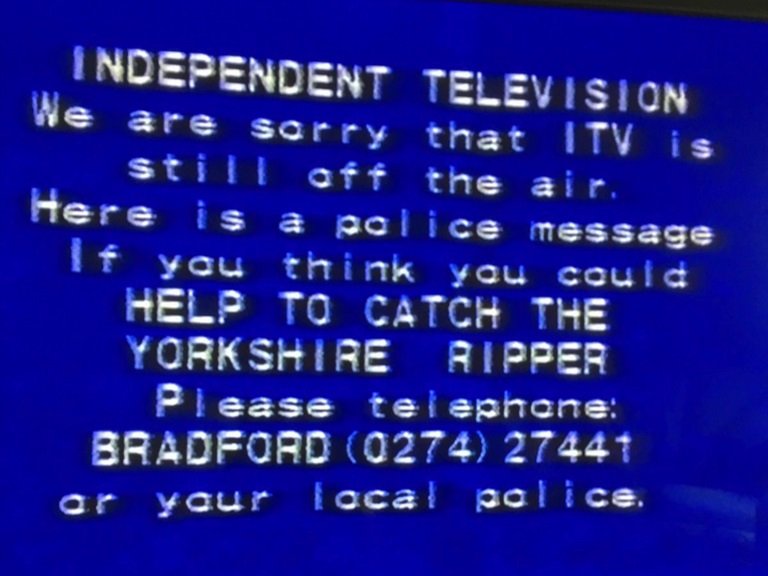
…Brrrrr. Let’s get back to the matter at hand, as quickly as possible…
Restarting… a timeline of events from “Everybody out!” to “Welcome home!”
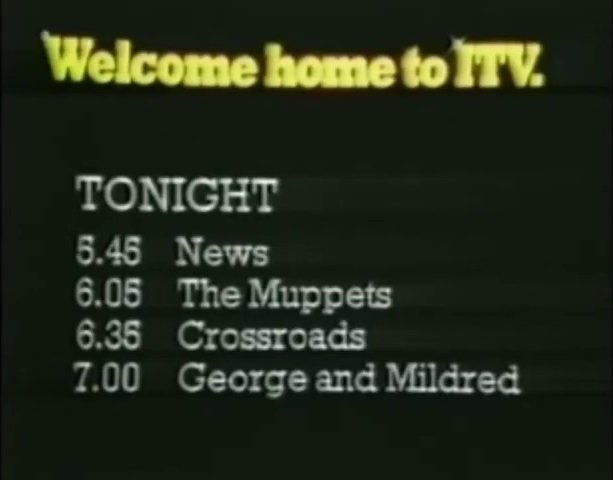
The first of these articles had a rundown of events leading up to the strike. So it stands to reason to do the same for how ITV crawled out of that massive hole…
10th September, 1979
- The intended date of the start of ITV’s 1979 autumn schedule. It comes and goes with people either watching BBC1, BBC2, or listening to the classical music over that apology caption. Or maybe they went to the cinema or a Joy Division gig, who knows?
21st September
- ITV management put another offer on the table to the collected unions (to refresh your memory, that’s the ACTT, EEPTU, and NATTKE). ITV declare it to be a “final” offer; reader, it wasn’t.
- The offer didn’t impress the unions, mainly consisting of ITV’s original offer of 15% now backdated to July, with the additions of a promised further 5% increase the following July, and two other cost-of-living related increases for 1980 and 1981.
- In return, the unions would have to accept the use of electronic news gathering equipment (also known as ENG). In other words, that would be the increased use of video over film cameras on location.
- The three unions all decided to hold off from either reccomending or refusing the offer, and put it to their members in a national ballot.
- Paul Fox, one of the heads of Yorkshire TV and part of the negotionating team, warns everyone that management were willing to start an emergency service, operated by themselves, to transmit the new autumn schedule. (Something like this had happened once before in 1968.)
24th September
- The ACTT decides that it won’t recommend the offer. This means EEPTU and NATTKE will follow suit.
26th / 27th September
- Following the ACTT’s refusal, everyone else follows suit and the results of the union’s national ballot overwhelmingly turns down ITV’s offer. Once again, no meaningful progress of any kind has been made…
Late September / Early October
- The ACTT put forward another claim. This redoubled their original demand, bringing the asked pay rise to 30%, backdated to July. The cost of living rises would be a 1% rise in pay in January 1980, and another 1% rise in July 1980.
- ITV turns down this offer flat, delcaring it to be “unrealistic”, and stating that such an demand might lead to pay going up to 50%.
11th October
- After weeks of deadlock, a major breakthrough occurs when NATTKE settle for a 26.3% pay rise to occur over the following year. EEPTU, who were negoating along with NATTKE, also agree to settle with that deal.
12th October
- With the other two unions forcing ACTT’s hand, the ITV companies work out a new pay deal with ACTT. They agree on an increase of pay between 40 to 45% over the following two years, the precise rise to be decided by the increase in cost of living.
- The ACTT agree to the gradual introduction of ENG, but without any staff being made redundant.
- Alan Sapper, leader of the ACTT, agrees not to recommend a rejection and puts it to a national ballot.
12th – 18th (?) October
- At some point during this period, EEPTU and NATTKE members vote in favour of the agreed deal.
19th October
- ACTT members across the country vote four to one in agreeing to the deal. For some reason, the only ITV company whose staff attempt to reject it are at Border Television. This may have been something to do with “Windscale”.
- The strike was effectively over – now began the rush to get back on screen.
Sound on, Vision on
At 12:47PM on 24th October, ITV returned – for about 15 seconds, about five hours ahead of the actual start time. If this sounds like a weird accident, you’d be right.
A Thames TV supervisor called Laurie Baker happened to be sitting in the announcer’s chair as everyone at Thames was checking the continuity studio’s equipment. Someone somewhere pressed the wrong button, and Mr Baker’s face was briefly transmitted across the entire nation until the wrong button was un-pressed.
The actual return of ITV happened at approx 5:40PM, later that night.
…Unless you lived in the Westward region, in which case two days previously you had been treated to a special transmission of the local news programe Westward Diary. The presenters welcomed (…welcomed, welcomed) everyone back well before Laurie Baker’s 15 seconds of fame. Apparently the lighting hadn’t been sorted out at that point, and everything was quite murky.
To give all the ITV regions a little bit of a way to get back into the swing of things, it was decided that the grand re-opening night would be networked directly from London. Thames TV took the honours, and pretended to be just plain old “ITV” that evening, going to the length of adjusting the Thames clock and having one of their senior announcers – Peter Marshall – addressing the entire nation as one big national channel.
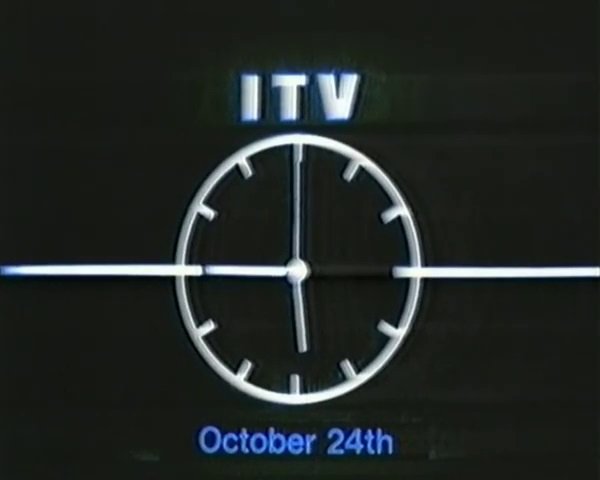
However, some space was left for individual regions to do their thing. Over at HTV, one of their main announcers – possibly either Terry Dyddgen-Jones or Gwyn Parry – opened up services for Wales & The West with a useful explanation of how all the usual programmes were going to get back on-air over the following week, and precisely what was happening that night. An audio recording of this definitely exists, as I’ve heard it… but, erm, I can’t find it anywhere now.
Over at Yorkshire, they launched with a full YTV start-up, using a new start-up theme and caption that had been intended to debut the previous month:
It also seems that STV took the same route as HTV that night – but went much further beyond a mere introduction. From the Scotland On Air wiki (which has proved to be an invaluable resource in putting all of this together):
STV did its own presentation that evening rather than taking the national service. Chief Announcer Tony Currie did the usual start-up at 17:40 before the ITN News at 5.45 and, during the evening, the station had local commercials and voiceover slides. Currie did an in-vision closedown after the film Chinatown.
And like STV, it seems most other ITV regions also did their own local closedowns.
One very well-recalled element of this first night back was the “Welcome home to ITV” graphic package, and the close-harmony sung theme. This jingle and promo package had been reportedly put together about a couple of weeks previously, using unaffiliated technicians and talent, in anticpation of having something ready to go after the strike ended.
It seems to have only been used for at most a week, possibly only a few days – but everyone watching at the time has had the following burnt into their brains for evermore:
After the rundown of that night’s programmes, which included The Muppet Show, the TV premiere of the movie Chinatown and the first of many, many episodes of 3-2-1 (of which there was a massive backlog), ITV went straight into the News At 5:45. Newscaster Leonard Parkin summed up the mood of everyone watching and working for the channel…
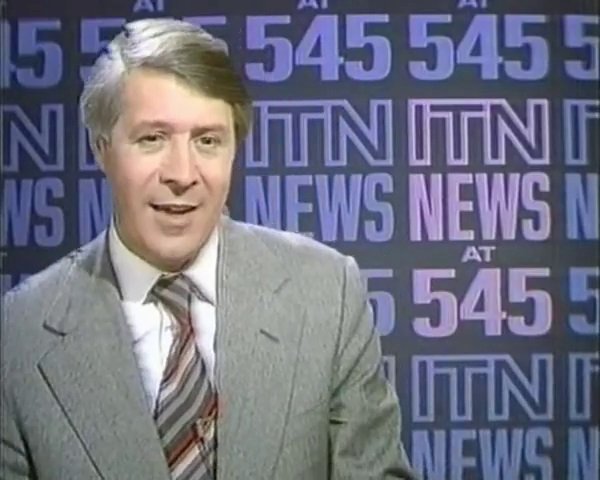
Good evening, again… it’s good to be back again, so let me simply say, let’s get on with it.
Epilogue
There’s a fair bit more that can be written about the 1979 ITV strike. I’m just going to end this on one final little thing.
Around January 1980 – a date which at one point was theorised to be the potential end of the strike – Heineken put out an advert that must have caused some viewers to have a heart attack when it began.
The following is from the History Of Advertising Trust – watch below…

